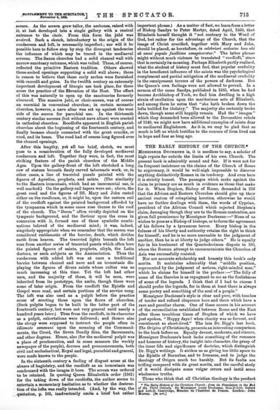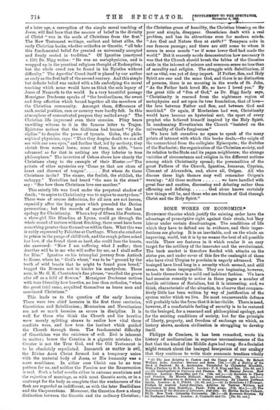THE EARLY HISTORY OF THE CHURCH.* MONSIGNOR DUCHESNE i8, it
is needless to say, 8 scholar of high repute far outside the limits of his own Church. The present book is admirably sound and fair. If it were not for its frequent insistence on the claims of the Church of Rome to supremacy, it would be well-nigh impossible to discover anything distinctively Roman in its tendency. And even here it is strictly honest. The passages which make against the claim to primacy are as much in evidence as those that make for it. When Stephen, Bishop of Rome, demanded in 256 that the African and Eastern Churches should give up their ancient custom of rebaptising heretics, otherwise he would have no further dealings with them, the words of Cyprian, president of the African Council which rejected Stephen's claim, damaging though they are to the Roman contention, are given full prominence by Monsignor Duchesne:—" None of us wishes to pose as a Bishop of bishops, or to force the agreement of his fellows by a tyrannous terror. Every bishop in the fulness of his liberty and authority retains the right to think for himself; and he is no more amenable to the judgment of another, than he is at liberty to judge others." He is equally fair in his treatment of the Quartodeciman dispute in 190, where the Roman attempt to excommunicate the Churches of Asia was successfully resisted.
Nor are accurate scholarship and honesty this book's only merits. It maintains admirably that "middle position, represented by the judgment of serious, right-minded men," which he claims for himself in the preface :—" The folly of some of the theories is as repugnant to me as the foolishness of some of the legends. I think that if I had to choose I should prefer the legends, for in them at least there is always some poetry and something of the soul of a people."
Monsignor Duchesne's style is clear and pure, with touches of tender and refined eloquence here and there which have a rare and peculiar charm. One of these occurs in his account of the reconciliation established between Rome and the East after those troublous times of Stephen of which we have just spoken, "Happy days I when charity was so fervent, and resentment so short-lived." The late Dr. Bigg's last book, The Origins of Christianity, presents an interesting comparison to the book before us. Equally devout, moderate, and sincere, Monsignor Duchesne's book lacks something of the romance and humour of history, the insight into character, the grasp of the inner life and significance of doctrine, which distinguish Dr. Bigg's writings. It strikes us as giving too little space to the Epistle of Barnabaa, and to Irenaeus, and to judge the theology of Origen much too harshly. But its faults are trifling compared with its great merits, and the careful study of it would dissipate some vulgar errors and instil some wholesome truths.
Those who think that all Christian theology is the product
• The Early History of the Christian Church from its Foundation to the End of the Third Century. By Monsignor Louis IDucheene, Don.D.Litt. Orford and Litt.D. Cambridge, Nombre de FInstitnt de France. London: John Murray. [9e. net.]
of a later age, a corruption of the simple moral teaching of Jesus, will find here that the essence of belief in the divinity of Christ "was in the souls of Christians from the first." The New Testament writings, earliest and latest alike, the early Christian books, whether orthodox or Gnostic, " all take this fundamental belief for granted as universally accepted and firmly rooted in tradition." Of Ignatius (martyred c. 110) Dr. Bigg writes : "He was no metaphysician, and is wrapped up in the practical religions thought of Redemption; but the whole creed can be found in his Epistles without difficulty." The Apostles' Creed itself is placed by our author as early as the first half of the second century. And this simple but definite belief was united with a life embodying the moral teaching which some would have us think the sole legacy of Jesus of Nazareth to the world. In a very beautiful passage Monsignor Duchesne speaks of "the brotherliness, the sweet and deep affection which bound together all the members of the Christian community. Amongst them, differences of rank, social position, race or country were hardly felt. In this atmosphere of concentrated purpose they melted away." The Christian life impressed even their enemies. Pliny bears unwilling witness to it in the famous letter to Trajam Epictetus notices that the Galileans had learned "by
dis-
cipline" to despise the power of tyrants. Galen, the philo- sophical physician, says : "That they despise death we can all see with our own eyes," and further that, led by modesty, they shrink from carnal lusts; some of them, he adds, "have advanced so far that in nothing are they inferior to true philosophers." The invective of Celsus shows how closely the Christians clung to the example of their Master :—" The priests of other mysteries cry 'Come ye that are clean of heart and discreet of tongue' But whom do these Christians invite? The sinner, the foolish, the childish, the unhappy." Tertrillian had heard "the man in the street" say: " See how those Christians love one another."
This saintly life was lived under the perpetual shadow of death; "to aspire to Christianity was to aspire to martyrdom." There were of course defections, for all men are not heroes, especially after the long peace which preceded the Decian persecution ; but the records of martyrdom are the best apology for Christianity. When a boy of fifteen like Ponticus, a slave-girl like Blandina. at Lyons, could go through the whole round of torture without flinching, there must have been something greater than themselves within them. What this was is nobly expressed by Felicitas at Carthage. When she cried out in prison in the pangs of childbirth, and the rough jailers asked her how, if she found these so hard, she could face the beasts, she answered: "Now I am suffering what I suffer; then Another will be in me who will suffer for me, as I shall suffer for Him." Ignatius on his triumphal journey from Antioch to Rome, where he, God's wheat," was to be "ground by the teeth of wild beasts that he might be found pure bread," begged the Romans not to hinder his martyrdom. These men, in Mr. G. K. Chesterton's fine phrase, "smelled the grave afar off as a field of flowers." Monsignor Dnchesne notices with true liberality how heretics, no less than orthodox, "when the great trial came, acquitted themselves as brave men and convinced Christians."
This leads us to the question of the early heresies. There were two chief heresies in the first three centuries, Gnosticism and Sabellianism ; Montanism and Novatianism are not so mueh heresies as errors in discipline. It is well for those who think the Church and the heretics were merely splitting straws to realise how vital these conflicts were, and how true the instinct which guided the Church through them. The fundamental difficulty of Gnosticism was the existence of evil. Evil is inherent in matter; hence the Creation is a gigantic mistake ; the Creator is not the True God, and the Old Testament is to be absolutely repudiated. Inasmuch as matter is evil, the Divine Aeon Christ formed but a temporary union with the material body of Jesus, or His humanity was a mere semblance. In either case Christ can be no true pattern for us, and neither the Passion nor the Resurrection is real. Such a belief results either in extreme asceticism and the rejection of marriage, as with most Gnostic sects, or in a contempt for the body so complete that the weaknesses of the flesh are regarded as indifferent, as with the later Basilidians and the Carpacratians. Moreover, the •Gnostics drew a sharp distinction between the Gnostic and the ordinary Christian; the Christian grace of humility, the Christian blessing on the poor and simple, disappear. Gnosticism dealt with a real problem, and has its attractions even for modern minds. "Are God and Nature then at strife?" Tennyson asks in one famous passage ; and there are still some to whom it seems in some moods "as if some lower God had made the world." But it scarcely needs demonstration how necessary it was that the Church should brush the fables of the Gnostics aside in the interest of science and common-sense no less than of morality and religion. The struggle with Sabellianism, if not as vital, was yet of deep import.. If Father, Son, and Holy Spirit are one and the same God, and there is no distinction of persons, there is no meaning in the words of St. John, "AS the Father bath loved Me, so have I loved you." By the great title of "Son of God," as Dr. Bigg finely says, "Christianity is rescued from the nightmare region of metaphysics and set upon its true foundation, that of love— the lore between Father and Son, and between God and mankind." Or again, if Montanism had won, Christianity would have become an hysterical sect, the sport of every prophet who believed himself inspired by the Holy Spirit. In condemning Novatianism the Church "insisted on the universality of God's forgiveness."
We have left ourselves no space to speak of the many points of interest with which this books deals,—the origin of the monarchical from the collegiate Episcopate ; the doctrine of the Eucharist; the organisation of the Christian society, and its relation to the State and its pagan neighbours; the strange varieties of circumstance and religion in the different nations among which Christianity spread; the personalities of the great Fathers of the Church, Ignatius, Irenaeus, Cyprian, Clement of Alexandria, and, above all, Origen. All who discuss these high themes may well remember Origeres warning "All these matters we have handled with great fear and caution, discussing and debating rather than affirming and defining God alone knows certainly how things will be, and those who are friends of God through Christ and the Holy Spirit."































































 Previous page
Previous page